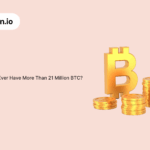In the past couple of years, BTC has become quite mainstream. The rising interest of institutions and, more importantly, some nations, has made BTC an interesting asset. And since President Trump was reflected, he has been a vocal supporter of cryptocurrencies as a whole.
One of the most interesting things the US administration has been peddling is the creation of a BTC strategic reserve. And that has become a part of numerous discussions in the crypto community. So what exactly is the BTC strategic reserve? How will it impact BTC’s future?
Well, it’s time to find out!
What Exactly Is a Bitcoin Strategic Reserve?
A Bitcoin Strategic Reserve, often shortened to SBR, is the idea of a national stockpile of BTC held by the United States government. Think of it as a digital counterpart to traditional reserves like gold or oil. Instead of barrels or bullion, the reserve would consist of Bitcoin stored under federal custody. The goal of this reserve would be to treat it as a long-term strategic asset.
The concept formally entered the spotlight in March 2025 when President Trump signed an executive order referencing both a Strategic Bitcoin Reserve and a US Digital Asset Stockpile. The idea was simple: America would officially hold Bitcoin in the same way it has historically held gold.
What Sparked the Talk About a US Bitcoin Strategic Reserve?
Conversations around a United States Bitcoin Strategic Reserve picked up speed after comments by Alex Thorn, head of firmwide research at Galaxy Digital. He pointed out in August that there is a high likelihood of the reserve being officially announced before the year closes. His remarks on X drew widespread attention.
The reason was simple. His remarks resonated with the rumours about strategic reserves when President Trump signed an executive order that established the idea of both a Strategic Bitcoin Reserve and a US Digital Asset Stockpile.
There was a lot of chatter because of this first formal acknowledgement. This was a sign that Bitcoin might play an important role in America’s long-term financial planning, according to some experts.
What Steps Have Lawmakers Taken Toward the Reserve?
The executive order laid the foundation. But the momentum was built later in late July. This is when lawmakers introduced a bill that asked the US Treasury to study the feasibility. The bill asked for a detailed report on how the reserve would work, the technical mechanics behind it, and how it might fit into the broader national interest.
That legislative move signaled that Congress is treating the idea seriously. It also showed that the topic is no longer confined to online chatter or niche policy reports. By directing the Treasury to dig in, lawmakers created a pathway for the reserve to shift from theory into practical steps.
Observers note that even with political debate, each legislative nod cements the possibility that the reserve will become more than a headline.
Why Do Experts Believe the Reserve Is Closer Than People Think?
Alex Thorn’s comments carried weight because he argued the market is underpricing the likelihood of an announcement. His view aligns with ongoing signals from within the administration. According to Cointelegraph reports, Trump’s crypto liaison has confirmed that interest in the reserve remains strong. Even though it only received a brief mention in a recent policy paper, that confirmation keeps the fire alive.
Thorn’s perspective is not isolated. Other analysts highlight that the pace of policy drafts, coupled with international developments, suggests the US wants a seat at the table before other governments get too far ahead. For them, the bigger picture goes beyond the executive order. It touches on America’s role in shaping the future of digital assets.
What Do Skeptics Say About the Timeline?
While some industry voices expect a near-term announcement, others believe patience is required. Dave Weisburger, former chairman of CoinRoutes, expressed doubts about a 2025 launch. He suggested that 2026 looks more realistic, since the administration may want to build up reserves quietly before any public reveal.
This view hints at a strategy rooted in accumulation. If the government intends to buy large amounts of Bitcoin, doing so before making an announcement could reduce market shocks and keep acquisition costs more favorable. Weisburger’s position reflects a school of thought that sees timing as more about execution than public relations.
Skepticism also exists within parts of the Bitcoin community. Some fear the reserve will remain a concept until political winds fully shift. Yet these doubts haven’t slowed the speculation swirling around Washington.
How Do International Moves Pressure the United States?
While the US debates its next steps, several countries have already moved forward with digital asset reserves. In June, Samson Mow, founder of Jan3, stressed that the US risks being overtaken by others. He pointed out Pakistan as a possible early mover. His comments tapped into a growing worry: if America waits too long, competitors could lock in advantages.
Recent months have offered evidence of this global race. Kyrgyzstan advanced a bill in August to create its own cryptocurrency reserve. Indonesian officials also met with Bitcoin advocacy groups to discuss using reserves as tools for economic growth. These developments add urgency. They suggest that national Bitcoin reserves are no longer theoretical but part of active policymaking abroad.
For the US, these moves reinforce the sense that the question isn’t if reserves will exist, but how quickly America will finalize its own version.
Why Would the United States Treat Bitcoin as a Strategic Asset?
Calling Bitcoin “strategic” carries meaning that stretches beyond market speculation. Strategic assets are resources a nation considers essential for long-term stability, security, or influence. Traditionally, oil and gold held that label. But when they add BTC to that list, it will be valued at the highest level of acceptance. There might be nothing else more acceptable than BTC later, as per some experts.
Bitcoin’s limited supply makes it appealing in this context. With only 21 million coins ever to exist, it carries scarcity similar to gold. Supporters argue that holding Bitcoin could serve as a hedge against inflation or currency competition. For policymakers, the appeal lies in the diversification of reserves and reinforcing America’s role in digital finance.
Establishing a Bitcoin reserve also signals a commitment to innovation. It simply means the US accepts that digital assets are the future. And when accepted by a superpower, it might gain global acceptance, according to experts.
How Could a Reserve Shape Global Perceptions of Bitcoin?
If the US government officially confirms a Bitcoin reserve, the move could redefine how institutions view the asset. Analysts believe it would elevate Bitcoin’s status from a speculative digital token into a recognized component of state-level financial policy.
Such recognition shifts narratives. Instead of asking if Bitcoin has staying power, discussions would turn toward how it fits into existing systems. Banks, corporations, and other governments often take cues from US policy. A reserve announcement could trigger a wave of reassessment in boardrooms and ministries worldwide.
It also brings credibility. Skeptics who once dismissed Bitcoin as a passing trend would face a clear counterpoint: the United States formally classifies it as strategic. That label carries authority in a way no influencer tweet or private investment ever could.
How Do Analysts Interpret the Delay in Formalization?
Months after the March executive order, the absence of a concrete strategic plan raised questions. Observers ask why progress feels slow if the intention is clear. Analysts suggest that technical considerations require time. Building a national Bitcoin reserve involves custody systems, security protocols, auditing mechanisms, and coordination across multiple agencies.
Another angle relates to the accumulation strategy. If the government wants a certain quantity of Bitcoin before public acknowledgment, delaying formalization makes sense. That way, the US enters the market on its own terms, without broadcasting moves that could trigger price surges.
Delays don’t always mean inaction. They can also reflect complexity. The reason is that Bitcoin is a complex asset. So some experts believe it’s not a cakewalk for policymakers to create policy around it. There are a lot of boxes that need to be checked to make sure every issue is ironed out before there is an official declaration.
What Does the Strategic Reserve Mean for Bitcoin’s Long-Term Outlook?
A US Bitcoin reserve carries symbolic and practical weight. Symbolically, it validates the idea that Bitcoin belongs in the category of assets governments protect and preserve. Practically, it introduces a powerful new player into the market, one with resources, influence, and global reach.
Analysts view this as a step that could solidify Bitcoin’s role in financial history. With the US holding coins in an official capacity, the asset shifts into a new phase. Instead of just being part of private portfolios, it becomes part of national policy. That shift alters how future debates about digital currency unfold.
For Bitcoin itself, the reserve connects its decentralized ethos with the world’s most centralized institutions. It bridges grassroots adoption with geopolitical strategy. That fusion represents a milestone that few imagined during Bitcoin’s early days on niche forums.
Wrapping Up
Today, experts say that the US Bitcoin Strategic Reserve might be closer to reality than ever. Experts like Alex Thorn firmly believe that the market is underestimating how quickly BTC’s strategic reserve can become a reality.
But some skeptics like Dave Weisburger think it might take more time. Meanwhile, some countries like Kyrgyzstan and Indonesia are already taking big strides. According to some experts, this is clearly putting Washington under some pressure.
Calling Bitcoin strategic shows how governments are changing their stance on the asset itself. The time has now come where a lot of governments are thinking or are already building policies around it. If the US confirms its reserve, it will mark a defining moment in Bitcoin’s journey, one that positions the asset at the heart of future financial debates.










